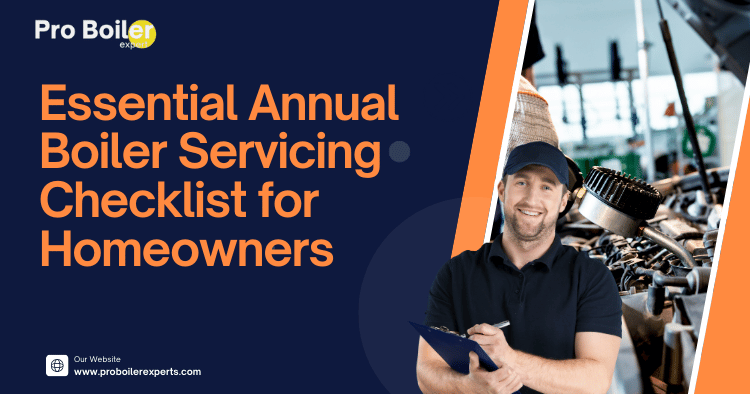Table of Contents
- Introduction
- Why Annual Boiler Servicing is Important
- Key Components of the Annual Boiler Servicing Checklist
- Hiring a Professional vs. DIY
- FAQs
- Conclusion
Introduction
As a homeowner, ensuring the efficiency and safety of your heating system is paramount. An annual boiler service not only guarantees that your boiler is running smoothly but also helps prevent costly repairs down the road. This comprehensive checklist will guide you through the essential steps to ensure your boiler remains in tip-top shape. Let’s dive in!
Why Annual Boiler Servicing is Important
Annual boiler servicing is crucial for several reasons:
- Safety: A malfunctioning boiler can lead to dangerous situations, including gas leaks and carbon monoxide poisoning. Regular servicing helps identify and rectify these issues.
- Efficiency: A well-maintained boiler operates more efficiently, which can save you money on energy bills.
- Longevity: Routine maintenance can extend the lifespan of your boiler, protecting your investment.
- Warranty Compliance: Many manufacturers require annual servicing to keep your warranty valid.
For more details about the importance of boiler servicing, check out the Health and Safety Executive.
Key Components of the Annual Boiler Servicing Checklist
When it comes to annual boiler servicing, it’s vital to cover all bases. Here’s a comprehensive checklist of what to look out for:
Visual Inspection
Start with a visual inspection. Look for any signs of wear and tear, corrosion, or leaks.
| Signs to Look For | Action Required |
|---|---|
| Rust or corrosion | Schedule a repair |
| Water around the boiler | Investigate for leaks |
| Unusual noises | Consult a technician |
A thorough visual inspection can save you from future headaches. Always be proactive!
Checking the Pressure
Check the pressure gauge to ensure it’s within the manufacturer’s recommended range, typically between 1 and 1.5 bar. If the pressure is too low, you may need to repressurize the system.
Inspecting the Flue
Ensure the flue is clear of obstructions. A blocked flue can lead to dangerous gases being trapped in your home. Look for any signs of soot or discoloration around the flue as well.
Remember, safety first! A clear flue is essential for proper ventilation and safety.
Cleaning the Boiler
Dust and debris can accumulate inside the boiler, reducing efficiency. Clean the boiler’s casing and any accessible parts. If you’re unsure, a qualified technician will have the tools and expertise to do this safely.
Testing Safety Features
Safety features like the emergency shut-off and pressure relief valve should be tested annually. Ensure they are functioning correctly to avoid dangerous situations.
Checking the Thermostat
Verify that your thermostat is working accurately. An inaccurate thermostat can lead to inefficient heating and increased energy bills.
An accurate thermostat is key to maintaining a comfortable home environment while saving on energy costs!
Inspecting for Leaks
Check all pipes and connections for signs of leaks. Even small leaks can lead to significant problems over time, including water damage and increased energy costs.
Checking the Anode Rod
If your boiler has an anode rod, inspect it for corrosion. A healthy anode rod can prevent rust and extend the life of your boiler. Consider replacing it if it’s more than 50% corroded.
Hiring a Professional vs. DIY
While some homeowners might feel comfortable performing basic maintenance, hiring a professional is always the safest option for comprehensive servicing. Professionals are trained to spot potential issues that may not be visible to the untrained eye. They also have the necessary tools and expertise to handle any repairs safely.
If you’re ever in doubt, always consult a professional. It’s worth the peace of mind!
If you opt for a DIY approach, make sure to follow safety guidelines and consult your boiler’s manual. However, consider scheduling a professional service at least every few years for a detailed inspection.
FAQs
How often should I service my boiler?
It’s recommended to service your boiler annually to ensure safety and efficiency.
What happens during a boiler service?
During a boiler service, a qualified technician will perform a comprehensive inspection, check safety features, clean the unit, and ensure everything is functioning correctly.
Can I service my boiler myself?
While you can perform basic maintenance, such as checking the pressure and cleaning the exterior, it’s best to hire a professional for thorough servicing.
What are the signs that my boiler needs servicing?
Signs include unusual noises, leaks, poor heating performance, and the pressure gauge showing low levels. If you notice any of these, it’s time to schedule a service.
Stay vigilant! Recognizing the signs early can prevent costly repairs and ensure your safety.
Conclusion
Regular boiler servicing is an essential part of home maintenance that can save you money, enhance safety, and prolong the life of your heating system. By following this checklist and scheduling an annual service, you can ensure your boiler remains efficient and reliable for years to come. If you have any doubts or concerns, don’t hesitate to reach out to a qualified professional for assistance. Happy servicing!
For more information on boiler maintenance, you may want to explore resources from the Energy Saving Trust.
Also Look For
- For tips on choosing the right boiler installer, refer to Top 5 Tips for Choosing the Right Boiler Installer.
- Learn about safety precautions in boiler installation with Top 7 Safety Precautions for Boiler Installation.
- Explore the importance of regular maintenance with Essential Boiler Maintenance Tips: Keep Your System Efficient.
- Check out Top 5 Benefits of Professional Boiler Maintenance Services for insights on the advantages of hiring professionals for boiler servicing.





